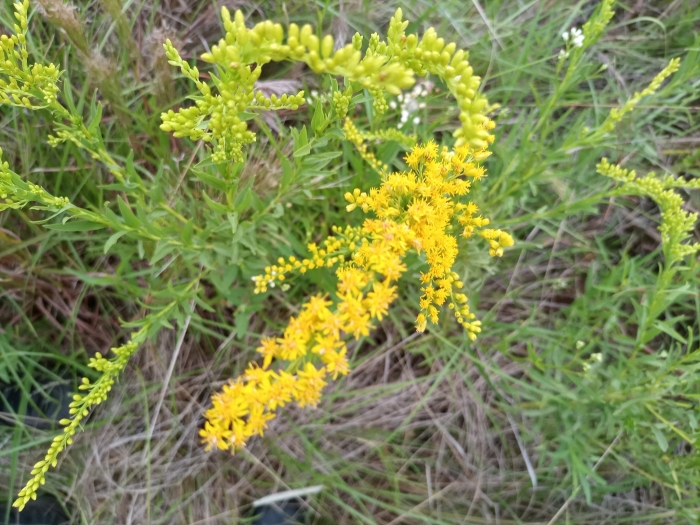Anise Goldenrod
(Solidago chilensis)
Anise Goldenrod (Solidago chilensis)
/
/

Bahiano Ayala
CC BY 4.0
Image By:
Bahiano Ayala
Recorded By:
Copyright:
CC BY 4.0
Copyright Notice:
Photo by: Bahiano Ayala | License Type: CC BY 4.0 | License URL: http://creativecommons.org/licenses/by/4.0/ | Rights Holder: Bahiano Ayala | Publisher: iNaturalist | Date Created: 2022-03-05T11:34:17-08:00 |

























Estimated Native Range
Summary
Solidago chilensis, commonly known as Anise goldenrod, is a perennial herb native to grasslands and open areas in South America, particularly Chile and Argentina. It typically grows to a height of 2-3 feet (0.6-0.9 meters) and is characterized by its upright, clumping form. The plant produces small, bright yellow flowers arranged in dense, pyramidal panicles that bloom in late summer to fall. These flowers are highly attractive to pollinators and have a mild anise-like scent, which contributes to its common name. The foliage is lance-shaped and medium green in color.
Anise goldenrod is valued for its showy flowers and ability to attract wildlife, such as butterflies and bees. It is used in naturalistic plantings, wildflower gardens, and as a border plant. It thrives in full sun to part shade and prefers well-drained soil. While it is drought-tolerant once established, it benefits from regular watering during prolonged dry periods. Anise goldenrod can spread by rhizomes and self-seeding, which should be considered when planting. It is potentially invasive in some regions outside its native range, so gardeners should consult local guidelines before cultivation.CC BY-SA 4.0
Anise goldenrod is valued for its showy flowers and ability to attract wildlife, such as butterflies and bees. It is used in naturalistic plantings, wildflower gardens, and as a border plant. It thrives in full sun to part shade and prefers well-drained soil. While it is drought-tolerant once established, it benefits from regular watering during prolonged dry periods. Anise goldenrod can spread by rhizomes and self-seeding, which should be considered when planting. It is potentially invasive in some regions outside its native range, so gardeners should consult local guidelines before cultivation.CC BY-SA 4.0
Plant Description
- Plant Type: Herb
- Height: 3-6 feet
- Width: 1-2 feet
- Growth Rate: Moderate
- Flower Color: Yellow
- Flowering Season: Spring, Summer, Fall
- Leaf Retention: Deciduous
Growth Requirements
- Sun: Full Sun
- Water: Medium
- Drainage: Medium
Common Uses
Bee Garden, Border Plant, Butterfly Garden, Low Maintenance, Street Planting
Natural Habitat
Native to grasslands and open areas in South America
Other Names
Common Names: Chilean Goldenrod, Tall Goldenrod, Huellen, Chilean Solidago, South American Goldenrod
Scientific Names: , Solidago chilensis, Solidago bonariensis, Solidago bonariensis, Solidago coquimba, Solidago coquimbana, Solidago floribunda, Solidago laxiflora, Solidago linearifolia, Solidago linearifolia var. brachypoda
GBIF Accepted Name: